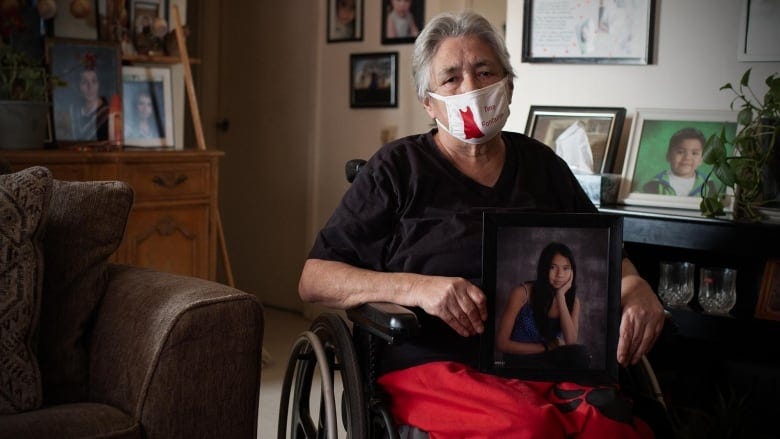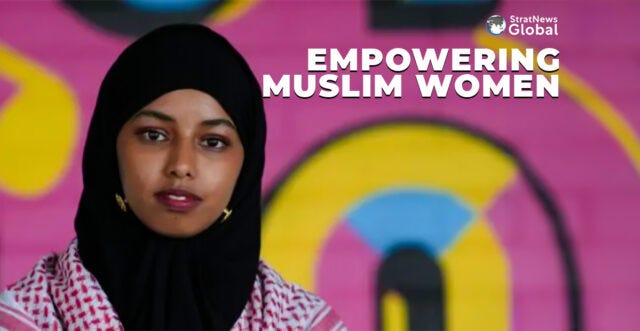Global Roundup: Women & Girls in Mali, LGBTQ+ Nigerians Demand Justice, Remembering Tina Fontaine, Queer Black South African Art, Britain Muslim Women Self-Defense
Curated by Samiha Hossain
Kani, 17, was attacked by armed men near the border with Niger, where she had fled to escape violence in her hometown [Philip Obaji Jr/Al Jazeera]
tw: rape, sexual assault
Kani, 17, spoke to Al Jazeera from the home of a local legumes farmer in the Nigerien border town of Ayourou, a town on the border with Mali, where many Malian refugees have settled in recent years and where she has been living for the past several weeks since crossing into Niger. Kani shared the sexual violence she and 10 others fleeing with her faced at the hands of six armed men at a checkpoint in Labbezanga, close to the border with Niger. Since the ordeal, she said, she has become terrified whenever she sees a man with a gun.
The rape victims were all young girls who said they begged their attackers not to harm them because they were exhausted and hungry following the long journey they had made without food and enough water. However, “everything [they] said fell on deaf ears,” according to Coumba, another 17-year-old girl who was also raped. Like Kani, she has been living at the home of the legume farmer in Ayourou since arriving in Niger. The pair had fled together from Ouattagouna in eastern Mali following a series of attacks on the town by armed groups from the so-called Islamic State in the Greater Sahara (ISGS).
Fleeing the violence, more than 10,000 Malians have taken refuge in Ayourou, an old town which stands on an eponymous island in the river Niger. Some live in tents built for refugees on dry and dusty land just outside the town, while others have found refuge with local families inside the town, where locals mostly do farming and sell foodstuffs and livestock in the market. Despite settling in quickly in their new home, Kani and Coumba now believe making the journey to Niger was a mistake.
We didn’t know we were going to face another hell trying to leave Mali. If we knew anyone would attempt to rape us, we would have left Ouattagouna for another community in Mali. -Coumba
In March 2023, around the time that Human Rights Watch reported armed groups based in the north of Mali were carrying out widespread killings, rapes and lootings in villages in the northeast of the country, fighters stormed the street where the girls lived, burned down some houses, seized a number of men and sexually abused women, including the two teenagers.
Reports of rape by rebels and other fighters in Mali have been mounting in number since the conflict began in 2012. But government-backed forces, including the Russian mercenaries drafted in to assist them, have greatly added to incidents of sexual violence especially in the last three years. Frequent raids by Malian soldiers and Russian paramilitaries have made local people more afraid and anxious.
This article contains a description of fatal violence against a Black person of marginalized gender.
“Abuja Area Mama,” a Nigerian self-described crossdresser and sex worker who documented her life on social media, was found dead by the side of a highway near her home in Abuja this week. “Mama” kept her full identity a secret online, but sometimes referred to herself as Ifeanyi in her videos – some have also referred to her as “Chantelle”.
News of Ifeanyi’s death sent shockwaves across Nigerian social media on Thursday and Friday last week. “We demand justice and an end to the violence,” representatives for The Initiative for Equal Rights (TIERs), a Nigerian LGBTQ+ advocacy organization, wrote in a statement on social media.
Being gay is still illegal in Nigeria (as is “crossdressing,” which was made illegal in 2022), and police violence against LGBTQ+ people is commonplace, leading some queer and transgender Nigerians to flee the country. Others, however, have built online spaces where they can freely express themselves, as Ifeanyi sought to do through her social media pages. Black LGBTQ+ advocates and public figures say that modern anti-LGBTQ+ sentiments in many African countries are tied to the long history of settler colonialism, particularly the enforced belief in Christianity in colonized territories. Religiously-affiliated groups like Family Watch International have been accused of influencing the passage of anti-LGBTQ+ laws in nations across the continent.
In the last 10 years, Thelma Favel has lived through losing her grand-niece Tina Fontaine, whom she helped raise, and seeing the man accused of her murder acquitted in 2018. 'These 10 years … have been so hard,' Favel says from her home near Sagkeeng Anicinabe Nation last week. (Rosanna Hempel/CBC)
Tina Fontaine’s slaying in 2014 brought the national tragedy of missing and murdered Indigenous women and girls in Canada into the spotlight. For the anniversary of Tina's death, her great-aunt Thelma Favel and Favel’s friend Marilyn Courchene are planning a feast and walk in Sagkeeng, the community about 100 kilometres northeast of Winnipeg where Favel helped raise Tina, to honour all missing and murdered Indigenous people. Favel was Tina's primary caregiver for most of her life.
She was so full of life, so happy. Everything in my house reminds me of Tina — everything, especially her room. That's where I feel so much closer to her…These 10 years … have been so hard. -Thelma Favel
Favel will also read a handwritten letter at Tina's heart-shaped gravestone on August 17, the day her body was pulled from the Red River 10 years earlier. "The shadows of the past are the light of tomorrow," it begins, her cursive handwriting stretching across two pages. Favel, who is undergoing cancer treatment, says the letter is her way of saying goodbye to her grand-niece.
Sagkeeng, which has a high rate of missing and murdered Indigenous women and girls, has experienced more tragedies since Tina's death, Favel said. Jeanenne Fontaine, Tina's cousin, was killed in Winnipeg in 2017. Samantha Hiebert went missing in 2019. Courchene's niece, Leah Keeper, was last seen in 2023. The community has lost so many people, it's creating a second community quilt to fit and honour everyone, Courchene said last week.
The community is in the process of finalizing Sagkeeng's family law, which is being designed to make sure that the First Nation's children, both on and off reserve, remain connected to their culture, and that families are healthy, prosperous and stable. Sagkeeng is also working on launching a healing centre for people experiencing addictions, along with a women's shelter. However, there is still a long way to go. Tina's death fuelled outrage across the country and helped galvanize the federal government into launching the National Inquiry into Missing and Murdered Indigenous Women and Girls in 2019 – however, as of last year, only two out of 231 calls for justice have been completed and more than half haven’t been started.
Earlier this year, Favel learned the man acquitted of second-degree murder in Tina's death, Raymond Cormier, died in April. It's news that brought her to tears, Favel said, "because he took all the answers with him: the why, the how. I'll never get that closure."
Zanele Muholi, photographed at the Bronze Works Foundry in Cape Town. The artist doesn’t have a permanent studio and instead lives and works nomadically.Credit...Manyatsa Monyamane
Zanele Muholi, a South African “visual activist”, has a nomadic artistic practice; they move their studio with them through the country. Muholi finds the people they photograph at parties, weddings and funerals. They also meet them at Pride rallies and protests for L.G.B.T.Q.I.A.+ rights in Johannesburg and Cape Town before taking the sitters’ portraits in a setting of their choosing. Their portraits are often black and white, which Muholi considers more timeless and less noisy than color. In their self-portraits, Muholi’s use of deep saturation and heavy contrasts not only dramatizes the pigment of their skin but also blurs the line between photography and painting.
At the San Francisco Museum of Modern Art and at London’s Tate Modern are surveys of Muholi’s work from the early 2000s until now; the latter revives a 2020 presentation that closed prematurely because of the pandemic. Both exhibitions primarily feature Muholi’s photographs of Black queer communities in South Africa, posed in scenes of tenderness and defiance, including “Brave Beauties” (2014-ongoing), a series of glamour shots of trans women and nonbinary people; and “Faces and Phases” (2006-ongoing), an ambitious archive of over 600 portraits of queer South Africans, which is accompanied by firsthand video testimonies from several of the participants.
Muholi’s creative work has always been synchronous with their advocacy, as they foreground the personal histories of people experiencing homophobic bigotry and violence throughout South Africa. They see their work as less of an individual practice and more of a deeply collaborative, explicitly political project.
It’s very important to make sure that as laws are put in place and transformation takes place, there’s a picture that backs all of that [history] up. -Zanele Muholi
The New York Times asked Muholi a series of questions in which they shared their schedule, their artistic process, and more.
Maya Hassan, a martial arts expert has organized a self-defence class at a London sports ground, in response to a wave of right-wing riots in Britain where Muslims and migrants faced violent and racist attacks. The 28-year-old martial arts expert looks on with pride as around 30 women, mostly Muslims and from ethnic minorities, join her self-defence class.
It gives you a little bit more confidence. You kind of know what to look for, how to be socially aware, how to spot things and how to get out of a really bad situation. -Maya Hassan
Elza Annan, a 24 year-old woman, said she felt more confident after attending the classes. Elza added that the classes are important as in recent incidents, far-right racists have come out and targeted people of colour. Tell MAMA UK, a group that monitors anti-Muslim incidents, said hate directed at Muslims was growing in Britain for some time. The group said that hate increased especially after the October 7 attack on Israel and Israel’s subsequent genocide in Gaza. Since the riots began, it had received more than 500 calls and online reports of anti-Muslim behaviour across Britain.
I obviously don’t want to have to use these techniques but it is useful and beneficial to have them. -Elza Annan
Hassan, who wears a hijab and is a Swiss national of Somali origin, moved to Britain in 2008. She felt that London was more welcoming to ethnic minorities than many parts of Europe. She wants to organize more classes – a similar event was planned for Manchester, northern England. For Maki Omori, 23, who is non-binary, Saturday’s class would help them prepare for counter protests.
The Three Hijabis, a campaign group, has held a large online conference call with Muslim women. The group intends to discuss the psychological impact of Islamophobic violence. Shaista Aziz, the group’s director, said some women feared that the violence could unleash confrontations or abuse and prompt many to stay close to home. “Today I advised a sister I dearly love to consider removing her hijab to stay safe as she travels through the Northeast …” she said on X.
Thank you for reading Global Roundup. You can support FEMINIST GIANT by:
Hitting the heart button so that others can be intrigued and read
Upgrading to a paid subscription to help keep FEMINIST GIANT free
Opting for a one-time payment via buying me a coffee
Sharing this post by email or on social media
Samiha Hossain (she/her) is an aspiring urban planner studying at Toronto Metropolitan University. Throughout the years, she has worked in nonprofits with survivors of sexual violence and youth. Samiha firmly believes in the power of connecting with people and listening to their stories to create solidarity and heal as a community. She loves learning about the diverse forms of feminist resistance around the world.








